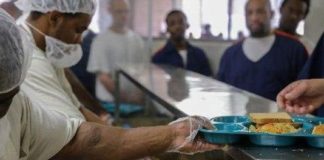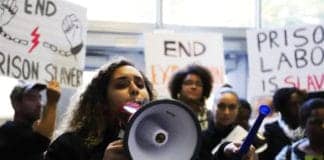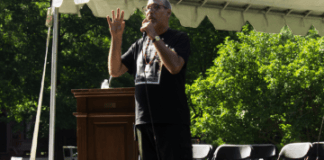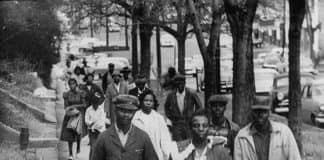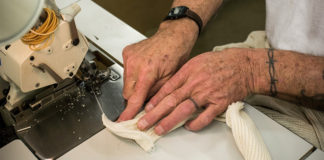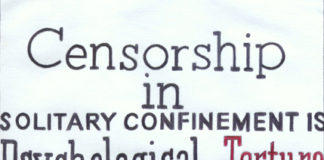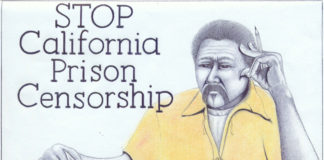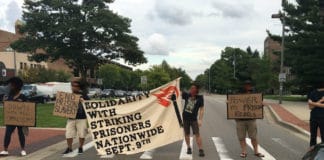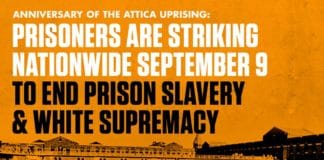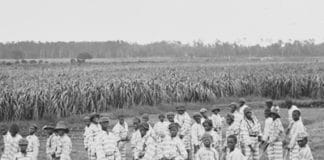Tags Prison labor
Tag: prison labor
Aramark is pimping the Georgia DOC
Aramark serves pre-cooked, freeze-dried, dehydrated, processed and mechanized meals and uses the DOC offenders to operate its company with free labor. The offenders cook, serve and clean under DOC’s supervision and Aramark maintains a skeletal staff of less than five employees in total, and one at any given time. The prison recently had an audit, which it failed in its food service department.
Physicians and medical students stand in solidarity with prison strikers
As incarcerated people across the country began a three-week series of protests, a contingent of physicians, health professions students and other allied health professionals expressed their solidarity with the protestors. More than 125 students and healthcare providers signed an open letter endorsing the National Prison Strike, with many participating in local solidarity actions or making phone calls to prisons to show support for the strikers’ demands.
Call for a Juneteenth 2018 Mobilization Against Prison Slavery
This year we, the undersigned, are calling on all opponents of mass incarceration and modern-day slavery internationally to honor the Juneteenth holiday – Tuesday, June 19, 2018 – with community organizing and direct action. This call to action is inspired by prisoners in Texas and Florida, two of the largest and most repressive prison systems in the U.S., who remain active in freedom struggle against all odds.
It’s not mass incarceration, but slavery
Speech delivered at the Millions for Prisoners Human Rights March Aug. 19, 2017, in Washington, D.C.: Let me tell you what’s going on here today. This is the largest gathering of slavery abolitionists in the history of the United States, happening right here today. In 16 cities across America, they are marching in unison with us and in solidarity with us, and they’re not doing it to end mass incarceration. They’re doing it to end what? (Slavery!) Slavery.
We must affect the bottom line
I started writing this series and planning this Campaign to Redistribute the Pain with the intention of getting everyone’s understanding up on the importance and power of economics to our struggle. We can’t march and protest our way to freedom. Instead, we have to bankrupt the corporate enterprise that was created by the 13th Amendment. I don’t make this statement lightly: The approximately 3 million people in U.S. prisons are or represent the most powerful group of labor in this country.
On Dec. 6, 1865, Black bodies were nationalized – and our...
As I write this article, I am not sure what day the Civil War began or what day it ended. The facts that I do know about the Civil War are not worth repeating here, as that story already occupies plenty of space in American text. My muse, instead, is about the particular vestige of slavery that the Civil War bequeathed to us on Dec. 6, 1865, that now forms the basis of our struggle to end mass incarceration and prison slavery in 2017.
California blames incarcerated workers for unsafe conditions and amputations
In September, prisoners across the country launched a nationwide strike to demand better working conditions at the numerous facilities that employ inmate labor for little or no pay. Inmates in America’s state prisons – who make everything from license plates to college diploma covers – are not only excluded from the U.S. Constitution’s prohibition on slave labor, but also exist largely outside the reach of federal safety regulations meant to ensure that Americans are not injured or killed on the job.
From media cutoffs to lockdown, tracing the fallout from the U.S....
Prisons in some states are withholding newspapers from inmates amid a strike against prison conditions and billions of dollars worth of prison labor. The passing of the 13th Amendment in 1865 formally abolished slavery, but with a stipulation that enabled plantation owners to use prisoners as a replacement for the lost labor. As a group called the Free Alabama Movement rallied for a Sept. 9 labor strike in spring, prison authorities across the country began clamping down on news and information in ways that the ACLU says may be in violation of the First Amendment.
Protest prison censorship of the Bay View: Use this sample letter
Nearly a thousand subscribers to the Bay View newspaper were denied their September papers – and we suspect their October papers as well – because of its coverage of the nationwide strikes to end prison slavery that began Sept. 9. Prison officials censoring the paper claim it will incite disruption. Like claims that someone being beaten by a gang of cops is “resisting,” the Bay View is “disrupting” prison operations.
Censoring the Bay View shows how much master fears a revolt
I recently received a form that was generated by the California City Correctional Facility administration. This form notified me that I would not be allowed to read my Bay View newspaper this month. While this may seem like a clear constitutional violation, CDCR has stipulated by law that no inmate may possess any literature “which contains or concerns plans to disrupt the order, or breach the security, of any facility.”
Free Alabama Movement Peace Summit turns chaos into community
Despite scant media coverage, the largest prison strike in history is entering its third week. Retaliation is rampant, both against the organizers in prison and against the Bay View for spreading the word. The Free Alabama Movement that started the prison-strikes-to-end-slavery campaign is defeating a violent divide-and-conquer scheme to turn prisoner against prisoner with a Peace Summit, reminiscent of the Agreement to End Hostilities in California, which this month is entering its fifth year of keeping the peace.
Sept. 9 prison strike was HUGE and is continuing
Anyone relying on mainstream media wouldn’t know it, but the U.S. prison system is shaking up right now. No one knows how big the initial strike was yet, but the information is slowly leaking out between the cracks in the prisons’ machinery of obscurity and isolation. Over the weekend more than 50 protests erupted across the country and around the world in solidarity with the Sept. 9 nationwide prisoner work stoppage and protest.
Sept. 9: Strike against prison slavery, strike against white supremacy
On Friday, Sept. 9, on the 45th anniversary of the Attica Uprising in New York, prisoners are calling for a general strike across all prisons in the United States against prison slavery. As the initial call out for the strike stated: “Slavery is alive and well in the prison system, but by the end of this year, it won’t be anymore. ... This is a call for a nationwide prisoner work stoppage to end prison slavery, starting on Sept. 9, 2016. They cannot run these facilities without us.”
Prisoners in multiple states call for strikes to protest forced labor
Prison inmates around the country have called for a series of strikes against forced labor, demanding reforms of parole systems and prison policies, as well as more humane living conditions, a reduced use of solitary confinement and better health care. The strike’s organizers remain anonymous but have circulated fliers listing a series of grievances and demands and a letter articulating the reasons for the strike.
We must leave the crops in the field
We have an opportunity to confront ourselves realistically, to have a stake in a real opportunity for freedom. The only way we can have an impact on the system is to make their oppression of us a financial burden that diminishes their profits rather than increases them. If they use the profits from your labor to write laws to keep you in prison, what does it profit you to work for them? If they intend for you to rot away in a cell, then let their crops rot away in the fields!
Prisoners’ Agreement to End Hostilities as the basis for the abolition...
On Oct. 10, 2012, the Pelican Bay D-Short Corridor Collective, men from various cultural groups and walks of life, put into effect the historic “Agreement to End Hostilities,” perhaps the single most significant “door to genuine freedom” opened in American society in recent human history. What makes it so significant is not simply its motive force but, more importantly, its true potential for our collective liberation as a society.
Inside a CCA private prison: Two slaves for the price of...
In 1973, the National Advisory Commission on Criminal Justice Standards and Goals issued a report which stated in part: “The prison, the reformatory and the jail have achieved only a shocking record of failure. There is overwhelming evidence that these institutions create crime rather than prevent it.” This same report stated directly: “No new institutions for adults should be built and existing institutions for juveniles should be closed.”
Texas prisons spend money cooling pigs, while inmates are dying from...
The Texas prison system, which incarcerates far more Black men than nearly every state in the country, is under scrutiny for spending $750,000 for facilities designed to keep pigs cool in its farming program, while simultaneously forcing inmates to live in such extreme heat that several people have died as a result.
Inmate slavery and the prison industrial complex: Resilience vs. docility
The much-publicized brutality and inhumane conditions suffered by prisoners in solitary confinement worldwide has once again sparked global debates on the unprecedented urgency of prison abolition and, by default, on the implementation of community-led restorative justice programs. Over the past two to three decades, the global penal system has turned increasingly roughshod and its practices have grown greatly abusive.
Crime, criminalization and gun control: Oakland leads the way in crime...
Oakland may seem like a local anomaly with its big increase in homicides in 2011-12 and the anti-crime hysteria which now engulfs it. But Oakland is just a prime example of the intertwining of crime and criminalization under capitalism, in which the ruling class divides working people one from another and targets particular groups for victimization.




